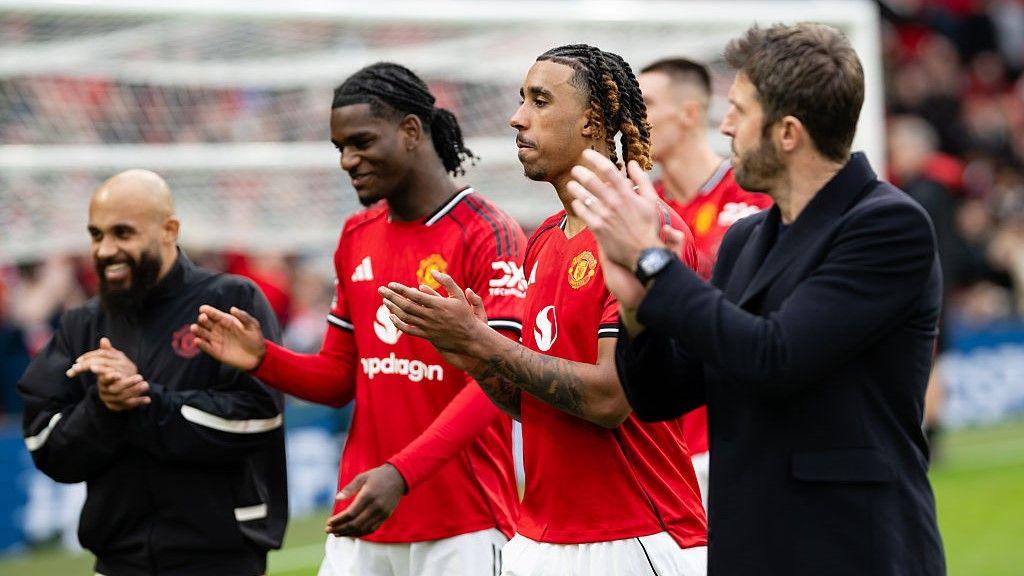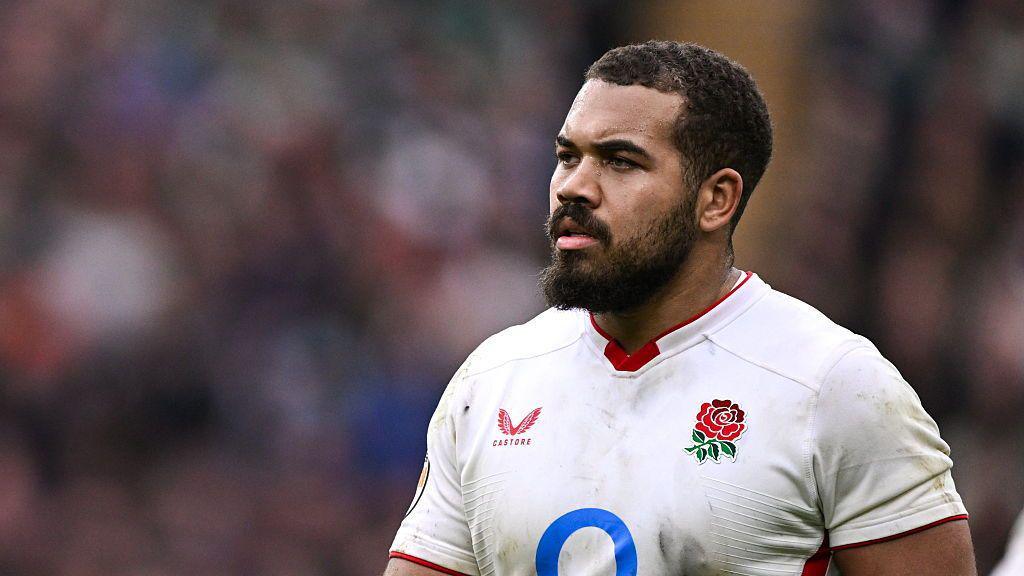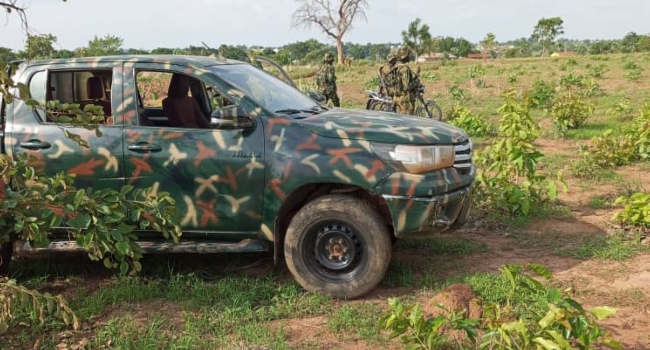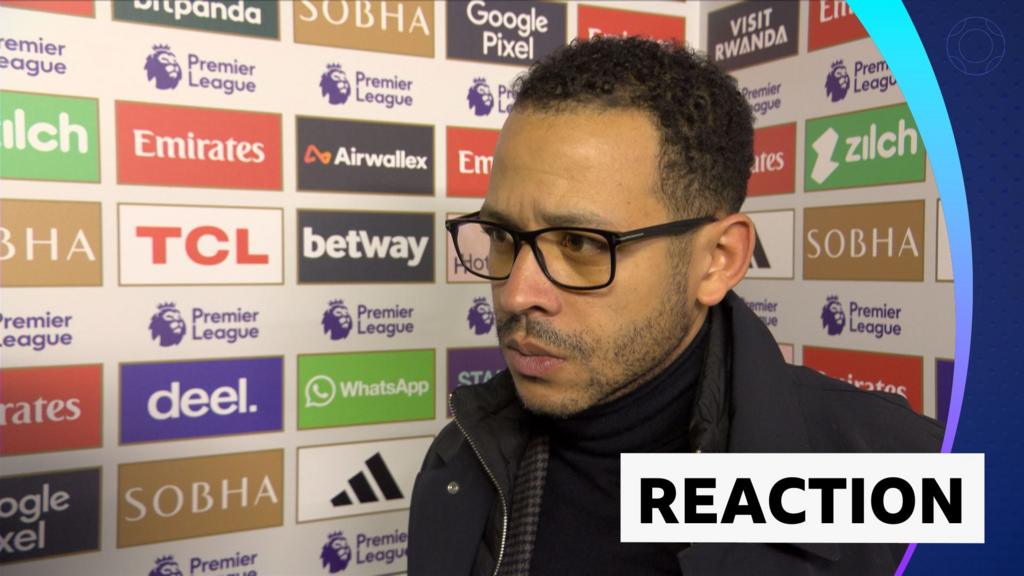To play this video you need to enable JavaScript in your browser.
- 274 Comments
While Manchester United’s hierarchy still need to answer big questions about Michael Carrick’s future, a significant one was answered on Sunday.
This one was asked of the players by the interim boss in the dressing room as they trailed at half-time to an excellent Crystal Palace side.
In his short seven-game tenure, Carrick had not had to deal with that situation before. Deficits had been limited to ‘in half’ and been corrected before they had come to an end.
“Things have been going in our favour, so at half-time I said to them, ‘here’s something I’ve been waiting for, this moment’,” said Carrick. “It was, ‘go on then, what are we going to do about it?’.
“You’ve got to find a way in games sometimes. It was a case of how do we react?”
Palace manager Oliver Glasner argued Carrick and his players benefited from a significant stroke of luck, the ‘Old Trafford bonus’ as he expressed fury at Maxence Lacroix crucial 56th-minute dismissal and subsequent penalty equaliser for United.
Either way, it is irrelevant now.
Carrick got his answer through a nerveless Bruno Fernandes spot-kick and Benjamin Sesko’s powerful header – the striker’s seventh goal in eight games since Ruben Amorim’s dismissal as head coach on 5 January.
United are now third in the Premier League. They have not been as high as that since the final day of the 2022-23 campaign under Erik ten Hag.
To play this video you need to enable JavaScript in your browser.
Six wins and a draw from his seven games in charge means it is seven and two overall for Carrick, who beat Arsenal and drew with Chelsea in the Premier League during his first stint as temporary boss following Ole Gunnar Solskjaer’s dismissal in November 2021.
That equals the joint-best return from the first nine games as manager from anyone in the competition’s history.
Ange Postecoglou had that record on his own, but the way it turned out for the Australian at Tottenham underlines the point that not too much can be read into current form.
But the sustained singing for Carrick as he made his way round the pitch with his players on a lap of appreciation after the final whistle – missed by Luke Shaw after he was substituted in the first half due to illness – suggests the supporters have already delivered their verdict.
United’s powerbrokers, though, may be wary of moving too fast by making a permanent appointment.
Seven years ago, Carrick was part of Solskjaer’s backroom team as the Norwegian started his temporary tenure with eight successive wins in all competitions and took 32 points from a possible 36, then finished the campaign with eight from eight games after he was confirmed in the post.
But, with Thomas Tuchel already extending his contract with England and Carlo Ancelotti about to with Brazil, providing Carrick can navigate the club’s journey back to the Champions League, we are already reaching the point where it would look more of a gamble not to hand him the job permanently.
It is beginning to feel more of a risk to appoint Glasner – despite his Europa League and FA Cup triumphs – when he leaves Palace at the end of the season.
Or Roberto de Zerbi, whose football is undoubtedly excellent – or any of the other candidates, rather than stick with someone who has gone about his work in such a calm and unfussy way while, crucially, dealing with the spotlight constantly trained on Old Trafford.
By instinct, Carrick does not feel comfortable talking about his own part in United’s advancement. Answers tend to be prefaced with the word ‘we’ rather than ‘me’.
However, the 44-year-old was willing to concede that having his song echoing round Old Trafford was a pleasant feeling.
“This place means a lot to me, so to have so much positivity, with everyone enjoying coming to the games and obviously for me to have an influence on that, of course it feels good, I’m not going to lie,” he added.
“The players have to take a lot of credit for that in terms of what they put on the pitch.
What information do we collect from this quiz?
The penalty controversy
Glasner was left frustrated at how Palace had twice led United at half-time this season and ended up with nothing on both occasions.
To him, this one hinged on the moment 11 minutes into the second half when Palace goalscorer Lacroix made a grab for Matheus Cunha. The initial contact was certainly outside the box, but continued into it and the United forward flung himself to the floor.
Referee Chris Kavanagh gave the penalty and, after reviewing the incident on the pitchside monitor, sent Frenchman Lacroix off.
Glasner described it as the ‘Old Trafford bounce’.
“It’s a very hard decision because the foul started outside the box and usually the foul has to be given where it starts,” he said.
“On the other side, Matheus Cunha was very smart to wait until he’s inside the box to fall.
“Maybe he could have conceded the red card with the foul outside the box, this is what you can discuss, but it’s where the foul starts. Maybe it was the Old Trafford bounce.”
While Glasner felt it was a ‘home’ decision, vastly experienced former Premier League assistant referee Darren Cann said the ruling was right.
“Kavanagh took his time and used all his experience to rightly ascertain that contact continued inside the penalty area and awarded a penalty kick,” he added.
Related topics
- Manchester United
- Football











